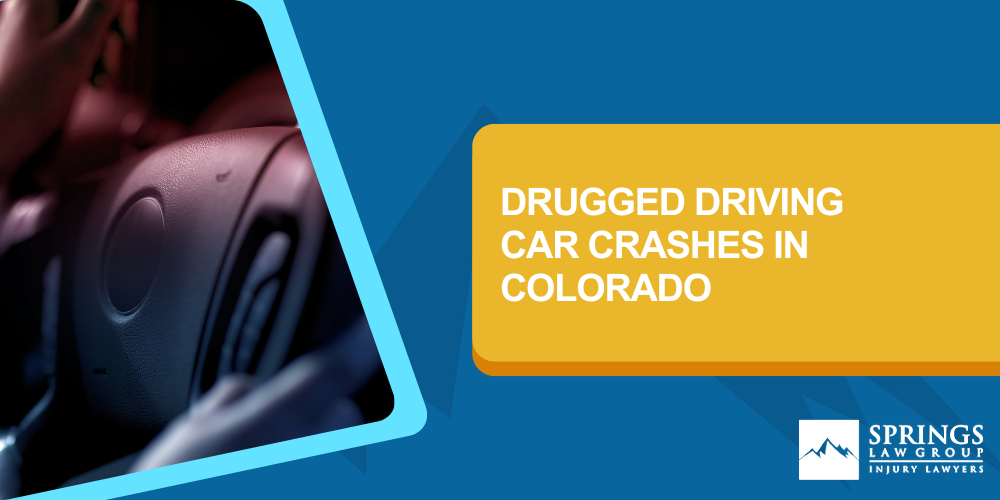Drugged Driving Car Crashes in Colorado

Driving a motor vehicle while perfectly competent and in control of one’s faculties can be challenging under some certain circumstances, particularly in inclement weather or heavy traffic. But when alcohol is added, it is well-known that drunk driving becomes one of the most dangerous activities that a person can engage in. The same is true for “drugged driving,” or driving while under the influence of a drug, medication, or narcotic. In fact, recent studies and new sources are reporting that drugged driving has now become more prolific than drunk driving. This is particularly true in Colorado after the legalization of marijuana, which has seen a 14% increase in motor vehicle crashes wherein the defendant was under the influence of marijuana.
Here at the Springs Law Group, our Colorado Springs car accident lawyer knows that driving while ability impaired by alcohol or now the more common “drugged driving” is incredibly dangerous for innocent people on or near the roadway. Victims who have been seriously injured or wrongfully killed due to a driver who has tested positive for any legal or illegal drug, including marijuana, should call us to learn how we can help recover compensation for pain and suffering, medical bills, lost wages, lost earnings, and other damages by dialing (710) 421-7141 for a FREE consultation. We know how to prove liability to help support your case.
Proving Liability in Drugged Driving Cases
Colorado car crashes caused by a drugged driver require both a factual and legal investigation to prove a plaintiff’s case.
First, an injured plaintiff will need to gather the facts determining whether the defendant-driver was indeed intoxicated at the time of the collision. This is usually done by law enforcement in a concurrent criminal investigation. Colorado law requires a driver to submit to a substance test following a crash where drug usage is suspected, or pursuant to police request premised on probable cause. A defendant-driver will be charged and have a criminal proceeding in a local court, of which a guilty plea or toxicology results can be used in your favor. Other times a defendant will admit to operating his or her vehicle while under the influence of a drug. This could occur to police, a local court, or to healthcare providers at the hospital following a crash.
Second, once the facts establish that the defendant-driver was operating his or her vehicle while under the influence of a drug, the plaintiff must prove the defendant-driver is negligent and liable in causing the crash and related injuries. This can be achieved through the doctrine of negligence per se if the plaintiff can prove that a statutory violation caused his or her injury, and the statute that was violated was meant to protect the plaintiff from this type of harm, then the plaintiff can prove that the defendant-driver is automatically negligent.
Under Colorado Revised Statute (CRS) section 42-4-1301, a defendant-driver who operates his or her vehicle while “under the influence of . . . one or more drugs, or a combination of both alcohol and one or more drugs, commits driving under the influence.” Further, this section creates a “permissible inference” that the defendant was under the influence of one or more drugs where the “the driver’s blood contained five nanogram or more delta 9-tetrahydrocannabinol per milliliter in whole blood[.]”
Therefore, a victim who can demonstrate that a defendant-driver had 5 or more nanograms of a substance indicative of recent marijuana use, the victim will likely be able to prevail on his or her personal injury case caused by a drugged driver in Colorado.
